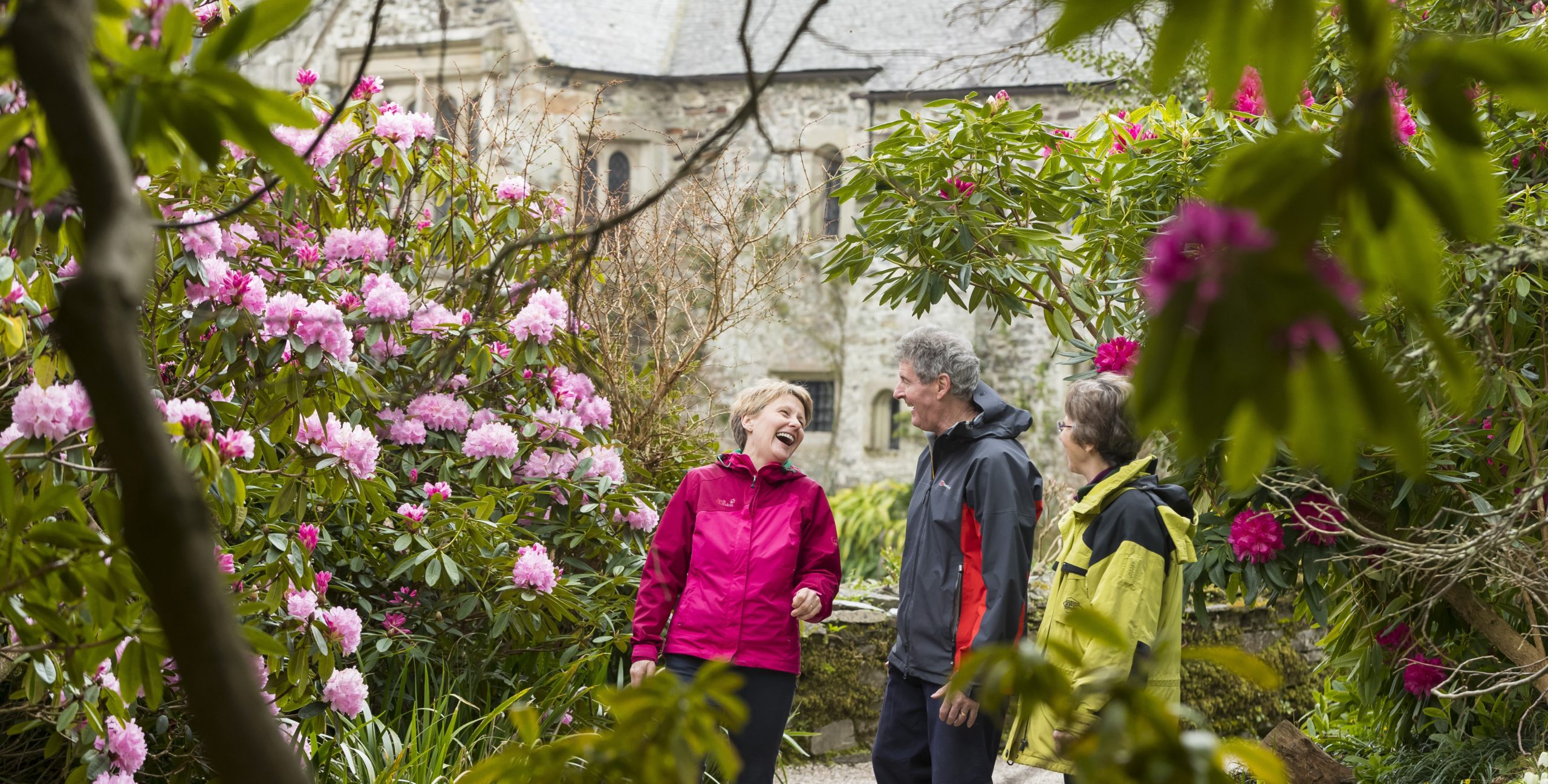-
A Natural Health Service: Social prescribing in the heritage sector
Posted on May 20, 2020
Visitors exploring the garden at Cotehele, Cornwall.
Social prescribing enables doctors to refer people to the National Trust for involvement in activities that support their health and well-being.
Collaboration with the Lottery was one of the specific practices identified by the Innocastle team on their study visit to the UK in May 2019. The ‘good practice’ is available on the Interreg Europe Policy Learning Platform with additional resources here on the INTO site.
Readers directed here from the Policy Learning Platform – please scroll down for a selection of resources.
A Natural Health Service: Social prescribing in the heritage sector
General Practitioners (doctors) spend almost one fifth of their consultation time dealing with social rather than health issues. (Citizens Advice Report: A Very General Practice, 2015) One solution is social prescribing. This enables GPs to connect patients with community groups and services for practical and emotional support.
Since its foundation, the National Trust has believed in the health benefits of its places. From volunteering in a beautiful garden to just enjoying the peace and relaxation of a visit. From meeting people and finding a new role in life to exercise, fun and fresh air.
In 2019, the Trust formed a partnership with a surgery to test the theory. And to pilot a new approach to social prescribing.
How does it work?
The surgery refers people with long-term conditions, loneliness or mental health issues to the Trust. The local team in North Devon organises weekly activities. This could be either a gentle walk or countryside management work. Nothing too strenuous: habitat restoration, repairing the coastal path or beach cleaning.
These have proven, amongst other things, to reduce stress levels, increase physical health and improve self-esteem. The Trust benefits too in having more volunteers to carry out conservation work and deepen engagement with the local community. And from the surgery’s perspective, social prescribing helps people take greater control of their own health and well-being, and eases the burden on clinical services. The main stakeholders are healthcare providers like doctors, nurses and other agencies. The main beneficiaries are members of the public and the National Trust.

A mother and child beside a fountain at Powis Castle and Garden, Powys, Wales.
Potential for learning transfer
Historic castles, manors and estates appeal to visitors because they are safe, comfortable and welcoming. But they could often do more to embrace a broader diversity of people with specific health and well-being needs.
There is currently significant interest in the impact of natural and cultural heritage on health and well-being across the sector. The Trust’s own research into ‘Places that Make Us’ proves the strong emotional connection between people and places.
The potential therefore for heritage to play a role in preventive care anywhere in the world is great. Moreover this growing body of experience should make it easier to develop partnerships with others already operating in this field.
Whilst the best partnerships are mutually beneficial, heritage sites do need to start with the needs of their audience. That is to say, local healthcare priorities rather than their own agenda. The New Economics Foundation provides a helpful framework around the themes of social relationships, physical activity, awareness, learning, and giving.
Resources
Inspire SW: Listen to this podcast where Ranger Dave Jolley and Combe Coastal Practice Manager Matt Wills discuss ‘social prescribing’ in North Devon. Their conversation starts at 2:20. (National Trust, 2019)
Active Guide to North Devon: The National Trust look after over 8000 acres (equivalent of 128,000 tennis courts) of North Devon coast and countryside for everyone to access. Combe Coastal Practice and the National Trust have teamed up to offer a selection of regular activities to ensure that everyone in North Devon can enjoy the health and well-being benefits of getting out and enjoying these special places. (National Trust, 2019)
Heritage, Health and well-being: A review of recent literature This useful presentation by Tate Greenhalgh, National Interpretation Specialist at the National Trust, brings together a wealth of studies examining the contributions natural and cultural heritage can make to health and well-being. Many offer recommendations for making more of the potential of heritage, including amplification through partnerships, and recent advocacy for social prescribing in attempt to use heritage to reduce demand on the NHS. (National Trust, 2018)
Places that Make Us: The National Trust has always believed that natural and historic places have a powerful effect on all of us, but they wanted to understand why places mean so much to us. What is at the heart of that connection, exactly? This report explores the depth of people’s connection with place. It is the first piece of research of its kind and it revealed that meaningful places generate a significant response in areas of the brain most commonly associated with positive emotions; demonstrating the strong emotional connection between people and places. (National Trust, 2017)
External resources on social prescribing
Five Ways to well-being: On the available evidence to date, this report identifies five key actions around the themes of social relationships, physical activity, awareness, learning, and giving. In general, the evidence base around the influencers of well-being is growing. Having strong social relationships, being physically active and being involved in learning are all important influencers of both well-being and ill-being. By contrast, the processes of giving and becoming more aware have been shown to specifically influence well-being in a positive way. A combination of all of these behaviours will help to enhance individual well-being and may have the potential to reduce the total number of people who develop mental health disorders in the longer term. (New Economics Foundation, 2008)
A Very General Practice: Lastly, this report presents recent Citizens Advice research on the level and impact of ‘non health’ demand faced by doctors in general practice (GPs). The central finding is that GPs in England spend almost one fifth (19 per cent) of their consultation time on patients’ non-health issues. This translates to an implied cost of nearly £400 million to the health service. (Citizens Advice, 2015)

 44 (0)20 7824 7157
44 (0)20 7824 7157